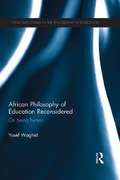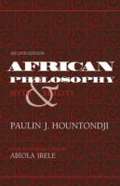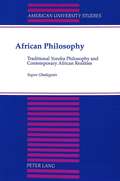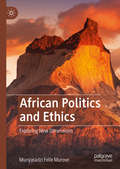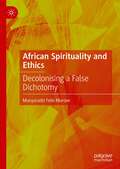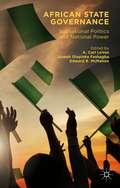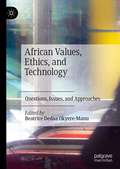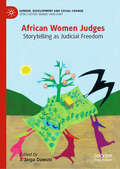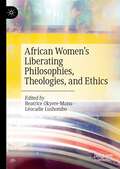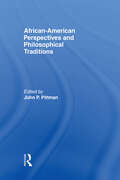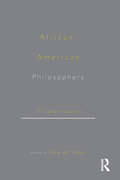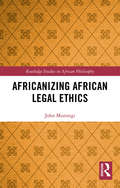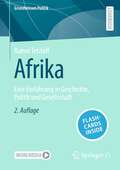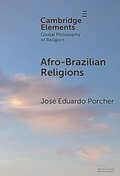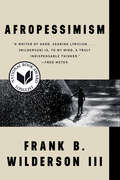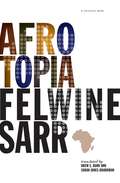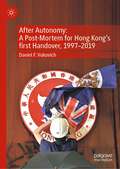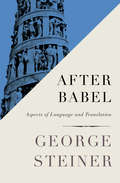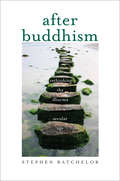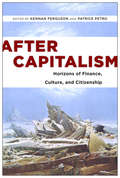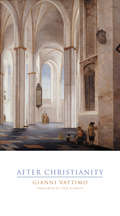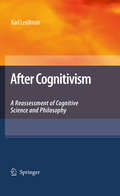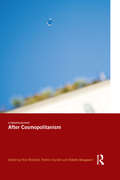- Table View
- List View
African Philosophy of Education Reconsidered: On being human (New Directions In The Philosophy Of Education Ser.)
by Yusef WaghidMuch of the literature on the African philosophy of education juxtaposes two philosophical strands as mutually exclusive entities; traditional ethnophilosophy on the one hand, and �scientific� African philosophy on the other. While traditional ethnophilosophy is associated with the cultural artefacts, narratives, folklore and music of Africa�s peop
African Philosophy: An Anthology
by Emmanuel Chukwudi EzeBringing together canonical philosophical texts from African, African-American, Afro-Caribbean, and Black European thinkers, this major new anthology is designed to serve both as a textbook and as the authoritative reference volume in Africana philosophical and cultural studies.
African Philosophy: Myth and Reality (Second Edition)
by Paulin J. Hountondji Jonathan Ree Henri EvansThis is a precious gem of a book for anyone who wishes to reflect on civilization and culture. --Choice In this incisive, original exploration of the nature and future of African philosophy, Paulin J. Hountondji attacks a myth popularized by ethnophilosophers such as Placide Tempels and Alexis Kagame that there is an indigenous, collective African philosophy separate and distinct from the Western philosophical tradition. Hountondji contends that ideological manifestations of this view that stress the uniqueness of the African experience are protonationalist reactions against colonialism conducted, paradoxically, in the terms of colonialist discourse. Hountondji argues that a genuine African philosophy must assimilate and transcend the theoretical heritage of Western philosophy and must reflect a rigorous process of independent scientific inquiry. This edition is updated with a new preface in which Hountondji responds to his critics and clarifies misunderstandings about the book's conceptual framework.
African Philosophy: Traditional Yoruba Philosophy and Contemporary African Realities
by Segun GbadegesinThe question whether or not there is African philosophy has, for too long, dominated the philosophical scene in Africa, to the neglect of substantive issues generated by the very fact of human existence. This has unfortunately led to an impasse in the development of a distinctive African philosophical tradition. In this path-breaking book, Segun Gbadegesin offers a new and promising approach which recognizes the traditional and contemporary facets of African philosophy by exploring the issues they raise. In Part I, the author examines, with refreshing insights, the philosophical concepts of the person, individuality, community and morality, religiosity and causality, focusing on the Yoruba of Nigeria. Part II discusses, in an original way, contemporary African social, political and economic realities from a philosophical perspective.
African Politics and Ethics: Exploring New Dimensions
by Munyaradzi Felix MuroveIn this book, Munyaradzi Felix Murove explores African traditional ethical resources for African politics. Arguing that African ethics is integral to African post-colonial political contentious discourse, Murove invites the reader to reflect on various problematic political issues in post-colonial Africa and how African ethics has been applied in these situations. Starting with a succinct discussion of the scope of African ethics, he discusses how African ethical values have been applied by post-colonial politicians in the reconstruction of their societies. Further, Murove looks critically at the issue of African poverty and how the ethic of regional integration and economic cooperation among post-colonial African nation-states has been instrumental to efforts aimed at overcoming the scourge of poverty. The main question this book seeks to answer is: Are African traditional ethical values a panacea to modern African political problems?
African Religions and Philosophy
by John S. MbitiDiscusses the philosophies, rituals, and ceremonies of various African religions and their influence in the lives of the people.
African Spirituality and Ethics: Decolonising a False Dichotomy
by Munyaradzi Felix MuroveThis book explores the symbiotic relationship that exists between African spirituality and ethics. Felix Murove discusses how these two concepts are entwined, and illustrates how they play a role in applied ethical issues. He argues that the general understanding of spirituality in Africa stems from Christianity, which has had a negative impact on African indigenous spirituality. The conceptual tools that run throughout the book are considerably Afro-centric, a methodological strategy which inevitably requires the reader to adopt some prior willingness to learn these Afro-centric concepts without easily resorting to western Christian and philosophical categories of thought. The book advocates for an Afro-centric conceptualization of spirituality and ethics, and encourages the reader to adopt a more holistic approach to African spirituality.
African State Governance: Subnational Politics And National Power
by A. Carl LeVan Joseph Olayinka Fashagba Edward R. McMahonAfrica is changing and it is easy to overlook how decentralization, democratization, and new forms of illiberalism have transformed federalism, political parties, and local politics. Chapters on Kenya, Nigeria, Ethiopia, and South Africa help fill an important gap in comparative institutional research about state and local politics in Africa.
African Values, Ethics, and Technology: Questions, Issues, and Approaches
by Beatrice Dedaa Okyere-ManuThis book charts technological developments from an African ethical perspective. It explores the idea that while certain technologies have benefited Africans, the fact that these technologies were designed and produced in and for a different setting leads to conflicts with African ethical values. Written in a simple and engaging style, the authors apply an African ethical lens to themes such as: The Fourth Industrial Revolution, the moral status of technology, technology and sexual relations, and bioethics and technology.
African Women Judges: Storytelling as Judicial Freedom (Gender, Development and Social Change)
by J. Jarpa DawuniThis edited volume centers the voices of African women judges as agents of justice and equality. The legal and personal narratives approach in the book privileges the contributors’ lived experiences, professional trajectories, contributions and challenges. The legal narrative storytelling approach also contributes to oral histories of African indigenous knowledge production and transfer. By highlighting the substantive representation of women in African judicial leadership, the chapters examine their impact on the development of jurisprudence, judicial administration, and contributions to the rule of law, access to justice, and women's rights in contemporary Africa. This book significantly contributes to the diversity of knowledge and representation in the global discourse on gender and judging, offering a novel contribution to the growing literature on African women judges.
African Women’s Liberating Philosophies, Theologies, and Ethics
by Beatrice Okyere-Manu Léocadie LushomboThis volume explores the ethical and philosophical paradigms presented by most of the influential Matriarchs of the Circle of African Women Theologians. It critically evaluates the effectiveness of their ethical and philosophical theories, models, and frameworks in pursuing justice and liberation for women in Africa and globally. The authors address critical questions: How have African women theologians reimagined existing ethical paradigms? What original ethical and philosophical ideas have they generated? How have their ethical frameworks influenced the theologies and interpretations they have developed? What purposes do their ethical and philosophical paradigms serve? How do these renderings intersect with various social categories, including gender, race, class, sexuality, capitalism, and colonialism? What liberating frameworks do they propose? The volume further explores the dialogue between distinct African contexts and universal experiences and values. It explores how universal themes such as humanity, human dignity, rights, justice, motherhood, and more can coexist with communal African concepts and themes. It contemplates how embracing African approaches engages these themes more globally, bringing together particular African contexts of women and the universal ethical, philosophical, and theological theories, models, and frameworks to advance the cause of justice and liberation for African women and women worldwide into the future.
African-American Perspectives and Philosophical Traditions
by John P. PittmanFirst published in 1997. Routledge is an imprint of Taylor & Francis, an informa company.
African-American Philosophers: 17 Conversations
by George YancyAfrican-American Philosophers brings into conversation seventeen of the foremost thinkers of color to discuss issues such as Black existentialism, racism, Black women philosophers within the academy, affirmative action and the conceptual parameters of African-American philosophy.
Africanizing African Legal Ethics (Routledge Studies in African Philosophy)
by John MurungiThis book is a philosophical inquiry into indigenous African legal ethics, asking what is African about African legal ethics? Taking us beyond a geographical understanding of Africa, the author argues for an African legal ethics that is distinct from non-African African legal ethics which are rooted in Euro-Western constructions. De-silencing African voices on African legal ethics this book decolonizes the prevailing wisdom on legal ethics and broadens our understanding of how law in Africa bears on ethics in Africa or, conversely, on how ethics bears on law in Africa. This book will be of interest to scholars of African philosophy, philosophy of law, and legal ethics.
Afrika: Eine Einführung in Geschichte, Politik und Gesellschaft (Grundwissen Politik)
by Rainer TetzlaffDas Lehrbuch bietet auch in der 2. erweiterten und aktualisierten Auflage einen vertieften Überblick über Geschichte und Politik Afrikas, vom Sklavenhandel, über die Phasen von Kolonialismus und Dekolonisation bis zu den Entwicklungsproblemen der Gegenwart. Dabei werden diverse Entwicklungstheorien zur Erklärung von erfolgreichen und fehlgeschlagenen Entwicklungspfaden einzelner Länder nach 1960 herangezogen. Thematische Schwerpunkte sind Europas koloniales Erbe, Staatsbildung und Staatszerfall, Demokratisierung, Rohstoffpolitik, Bevölkerungswachstum, Hunger und Armut, Kriege und ethnische Konflikte sowie Weltbank, EU, China und Russland als externe Akteure in Afrika.Zusätzliche Fragen per App: Laden Sie die Springer Nature Flashcards-App kostenlos herunter, um Ihr Wissen zu prüfen.
Afro-Brazilian Religions (Elements in Global Philosophy of Religion)
by José Eduardo PorcherThis Element introduces Afro-Brazilian religions and underscores the necessity for an expanded methodological framework to encompass these traditions in the philosophy of religion. It emphasizes the importance of incorporating overlooked sources like mythic narratives and ethnographies while acknowledging the pivotal role of material culture in cognitive processes. Furthermore, it advocates for adopting an embodiment paradigm to facilitate the development of a philosophy of religious practice. The Element illustrates this approach by examining phenomena often neglected in philosophical discussions on religion, such as sacrifice and spirit possession, and delves into the ontological commitments and implications of these practices. It also stresses the significance of employing thick descriptions and embracing interdisciplinary dialogue to cultivate a globally inclusive philosophy of religion, capable of engaging with phenomena frequently sidelined within the mainstream.
Afropessimism
by Frank B. Wilderson III“Wilderson’s thinking teaches us to believe in the miraculous even as we decry the brutalities out of which miracles emerge”—Fred Moten Praised as “a trenchant, funny, and unsparing work of memoir and philosophy” (Aaron Robertson,?Literary Hub), Frank B. Wilderson’s Afropessimism arrived at a moment when protests against police brutality once again swept the nation. Presenting an argument we can no longer ignore, Wilderson insists that we must view Blackness through the lens of perpetual slavery. Radical in conception, remarkably poignant, and with soaring flights of memoir, Afropessimism reverberates with wisdom and painful clarity in the fractured world we inhabit.“Wilderson’s ambitious book offers its readers two great gifts. First, it strives mightily to make its pessimistic vision plausible. . . . Second, the book depicts a remarkable life, lived with daring and sincerity.”—Paul C. Taylor, Washington Post
Afrotopia (Univocal)
by Felwine SarrA vibrant meditation and poetic call for an African utopian philosophy of self-reinvention for the twenty-first century In the recent aftermath of colonialism, civil wars, and the AIDS crisis, a new day finally seems to be shining on the African continent. Africa has once again become a site of creative potential and a vibrant center of economic growth and production. No longer stigmatized by stereotypes or encumbered by the traumas of the past—yet unsure of the future—Africa has other options than simply to follow paths already carved out by the global economy. Instead, the philosopher Felwine Sarr urges the continent to set out on its own renewal and self-discovery—an active utopia that requires a deep historical reflection on the continent&’s vast mythological universe and ancient traditions, nourishes a cultural reinvention, and embraces green technologies for tackling climate change and demographic challenges.Through a reflection on contemporary African writers, artists, intellectuals, and musicians, Sarr elaborates Africa&’s unique philosophies and notions of communal value and economy deeply rooted in its ancient traditions and landscape—concepts such as ubuntu, the life force in Dogon culture; the Rwandan imihigo; and the Senegalese teranga. Sarr takes the reader on a philosophical journey that is as much inward as outward, demanding an elevation of the collective consciousness.Along the way, one sees the contours of an africanity, a contemporary Africa united as a continent through the creolization of its cultural traditions. This is Felwine Sarr&’s Afrotopia.
After Autonomy: A Post-Mortem for Hong Kong’s first Handover, 1997–2019
by Daniel F. VukovichThis book offers a sharp, critical analysis of the rise and fall of the 2019 anti-extradition bill movement in Hong Kong, including prior events like Occupy Central and the Mongkok Fishball Revolution, as well as their aftermaths in light of the re-assertion of mainland sovereignty over the SAR. Reading the conflict against the grain of those who would romanticize it or simply condemn it in nationalistic fashion, Vukovich goes beyond mediatized discourse to disentangle its roots in the Basic Law system as well as in the colonial and insufficiently post-colonial contexts and dynamics of Hong Kong. He examines the question of localist identity and its discontents, the problems of nativism, violence, and liberalism, the impossibility of autonomy, and what forms a genuine de-colonization can and might yet take in the city. A concluding chapter examines Hong Kong’s need for state capacity and proper, livelihood development, in the light of the Omicron wave of the Covid pandemic, as the SAR goes forward into a second handover era.
After Babel: Aspects of Language and Translation
by George Steiner&“A brilliant work . . . A dazzling meditation on the very nature of language itself&” from the world-renowned scholar and author of The Poetry of Thought (Kirkus Reviews). In his classic work, literary critic and scholar George Steiner tackles what he considers the Babel &“problem&”: Why, over the course of history, have humans developed thousands of different languages when the social, material, and economic advantages of a single tongue are obvious? Steiner argues that different cultures&’ desires for privacy and exclusivity led to each developing its own language. Translation, he believes, is at the very heart of human communication, and thus at the heart of human nature. From our everyday perception of the world around us, to creativity and the uninhibited imagination, to the often inexplicable poignancy of poetry, we are constantly translating—even from our native language.
After Buddhism
by Stephen Batchelor<P><P><i>Advisory: Bookshare has learned that this book offers only partial accessibility. We have kept it in the collection because it is useful for some of our members. Benetech is actively working on projects to improve accessibility issues such as these.</i> <P><P>Some twenty-five centuries after the Buddha started teaching, his message continues to inspire people across the globe, including those living in predominantly secular societies. <P><P> What does it mean to adapt religious practices to secular contexts? Stephen Batchelor, an internationally known author and teacher, is committed to a secularized version of the Buddha's teachings. The time has come, he feels, to articulate a coherent ethical, contemplative, and philosophical vision of Buddhism for our age. After Buddhism, the culmination of four decades of study and practice in the Tibetan, Zen, and Theravada traditions, is his attempt to set the record straight about who the Buddha was and what he was trying to teach. <P><P>Combining critical readings of the earliest canonical texts with narrative accounts of five members of the Buddha's inner circle, Batchelor depicts the Buddha as a pragmatic ethicist rather than a dogmatic metaphysician. He envisions Buddhism as a constantly evolving culture of awakening whose long survival is due to its capacity to reinvent itself and interact creatively with each society it encounters. <P><P> This original and provocative book presents a new framework for understanding the remarkable spread of Buddhism in today's globalized world. It also reminds us of what was so startling about the Buddha's vision of human flourishing.
After Capitalism: Horizons of Finance, Culture, and Citizenship
by Andrew Ross A. Aneesh Geoff Mann Marcus Bullock Jeffrey Sommers Sherryl Vint Bernard C. Perley Cristina Venegas Esther Leslie Kennan Ferguson Niki Akhavan Patrice Petro Ivan AscherFrom Thomas Piketty to David Harvey, scholars are increasingly questioning whether we are entering into a post-capitalist era. If so, does this new epoch signal the failure of capitalism and emergence of alternative systems? Or does it mark the ultimate triumph of capitalism as it evolves into an unstoppable entity that takes new forms as it engulfs its opposition? After Capitalism brings together leading scholars from across the academy to offer competing perspectives on capitalism's past incarnations, present conditions, and possible futures. Some contributors reassess classic theorizations of capitalism in light of recent trends, including real estate bubbles, debt relief protests, and the rise of a global creditocracy. Others examine Marx's writings, unemployment, hoarding, "capitalist realism," and coyote (trickster) capitalism, among many other topics. Media and design trends locate the key ideologies of the current economic moment, with authors considering everything from the austerity aesthetics of reality TV to the seductive smoothness of liquid crystal. Even as it draws momentous conclusions about global economic phenomena, After Capitalism also pays close attention to locales as varied as Cuba, India, and Latvia, examining the very different ways that economic conditions have affected the relationship between the state and its citizens. Collectively, these essays raise provocative questions about how we should imagine capitalism in the twenty-first century. Will capitalism, like all economic systems, come to an end, or does there exist in history or elsewhere a hidden world that is already post-capitalist, offering alternative possibilities for thought and action?
After Christianity (Italian Academy Lectures)
by Gianni VattimoWhat has been the fate of Christianity since Nietzsche's famous announcement of the "death of God"? What is the possibility of religion, specifically Christianity, thriving in our postmodern era? <P><P>In this provocative new book, Gianni Vattimo, leading Italian philosopher, politician, and framer of the European constitution, addresses these critical questions. When Vattimo was asked by a former teacher if he still believed in God, his reply was, "Well, I believe that I believe." This paradoxical declaration of faith serves as the foundation for a brilliant exposition on Christianity in the new millennium—an age characterized by a deep uncertainty of opinion—and a personal account of how Vattimo himself recovered his faith through Nietzsche and Heidegger. He first argues that secularization is in fact the fulfillment of the central Christian message, and prepares us for a new mode of Christianity. He then explains that Nietzsche's thesis concerns only the "moral god" and leaves room for the emergence of "new gods." Third, Vattimo claims that the postmodern condition of fragmentation, anti-Eurocentrism, and postcolonialism can be usefully understood in light of Joachim of Fiore's thesis concerning the "Spiritual Age" of history. Finally, Vattimo argues for the idea of "weak thought." Because philosophy in the postmetaphysical age can only acknowledge that "all is interpretation," that the "real" is always relative and not the hard and fast "truth" we once thought it to be, contemporary thought must recognize itself and its claims as "weak" as opposed to "strong" foundationalist claims of the metaphysical past. Vattimo concludes that these factors make it possible for religion and God to become a serious topic for philosophy again, and that philosophy should now formally engage religion.
After Cognitivism: A Reassessment of Cognitive Science and Philosophy
by Karl LeidlmairThis book comprises a collection of papers dealing with the reassessment of thinking in Cognitive Science and in Philosophy today. Still dependent on basic assumptions of Cartesian philosophy, Cognitive Science took over the mistakes of classical computational models. Instead of being treated as mere or pure explanations of mental processes with hindsight, these models were mistakenly used as more or less literal causal descriptions of the (working of the) mind. A clear insight into the relevance of embodied and embedded knowledge is not only a central topic in AI research; it can become a driving force for a reassessment of philosophy. Philosophy, which is struggling with the two opposite alternatives of cultural relativism and rationalism, both of which have turned out to be dead ends, is in need of a reassessment of reasoning. What is needed is a reasoning without reference to ultimate reasons which at the same time is grounded (and doesn't fall into the trap of cultural relativism).
After Cosmopolitanism
by Rosi Braidotti Bolette Blaagaard Patrick HanafinAt a time when social and political reality seems to move away from the practice of cosmopolitanism, whilst being in serious need of a new international framework to regulate global interaction, what are the new definitions and practices of cosmopolitanism? Including contributions from leading figures across the humanities and social sciences, After Cosmopolitanism takes up this question as its central challenge. Its core argument is the idea that our globalised condition forms the heart of contemporary cosmopolitan claims, which do not refer to a transcendental ideal, but are rather immanent to the material conditions of global interdependence. But to what extent do emerging definitions of cosmopolitanism contribute to new representative democratic models of governance? The present volume argues that a radical transformation of cosmopolitanism is already ongoing and that more effort is needed to take stock of transformations which are both necessary and possible. To this end, After Cosmopolitanism calls for an understanding of cosmopolitanism that is more attentive to the material reality of our social and political situation and less focused on linguistic analyses of its metaphorical implications. It is the call for a cosmopolitanism that is also a cosmopolitics.
